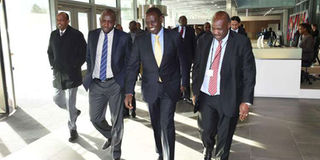DP Ruto to know fate of ICC case Friday

Deputy President William Ruto (second right) at the ICC in The Hague on January 15, 2016 accompanied by National Assembly Majority Leader Aden Duale (left), Elgeyo-Marakwet Senator Kipchumba Murkomen (second left) and Narok Governor Samuel Tunai (right). Mr Ruto will know fate of his ICC case on February 12, 2016. PHOTO | REBECCA NDUKU | DPPS
What you need to know:
The decision to use Rule 68 in the Kenyan post-election violence case would have a significant bearing on the no-case-to answer motions.
Mr Ruto and former radio journalist Joshua arap Sang seek to terminate the crimes against humanity charges against them.
A decision by the Appeals Chamber that favours the defence would mean that the evidence of five witnesses would be thrown out.
According to the evidence, the 2007/8 chaos was planned and financed in an organised manner.
Friday is Deputy President William Ruto’s moment of truth as the International Criminal Court delivers its decision on the use of recanted testimony at 6.30pm.
The decision to use Rule 68 in the Kenyan post-election violence case would have a significant bearing on the no-case-to answer motions.
Mr Ruto and former radio journalist Joshua arap Sang seek to terminate the crimes against humanity charges against them.
The Appeals Chamber on Monday announced that it would deliver its decision Friday.
WHAT IT MEANS
A decision by the Appeals Chamber that favours the defence would mean that the evidence of five witnesses would be thrown out.
This will weaken prosecutor Fatou Bensouda’s case as the statements of the five go to the heart of the violence.
According to the evidence, the 2007/8 chaos was planned and financed in an organised manner.
On the other hand, if the evidence is allowed, Mr Ruto and Mr Sang would almost certainly be staring at being put on their defence.
This could possibly prolong the post-election violence cases to the 2017 election year.
The victims’ legal representative Wilfred Nderitu said a decision in favour of the prosecution would be a win for justice.
“In a trial that has been marred by witness interference, I see a dismissal of the appeal as a victory for justice. It is the last frontier for justice in the circumstances,” Mr Nderitu said.
Equally looking forward to today’s decision will be the African Union which has been critical of The Hague court.
It participated in the appeals as amicus curiae (friend of the court). AU was represented by Prof Charles Chernor Jalloh.
The AU supported Kenya’s position to stop the application of Rule 68 of the Rules of Procedure and Evidence .
The Trial Chamber, on August 19, 2015 by majority admitted into evidence the out-of-court and unsworn statements of the five “for the truth of contents” under the now famous Rule 68 of the ICC’s Rules of Procedure and Evidence.




